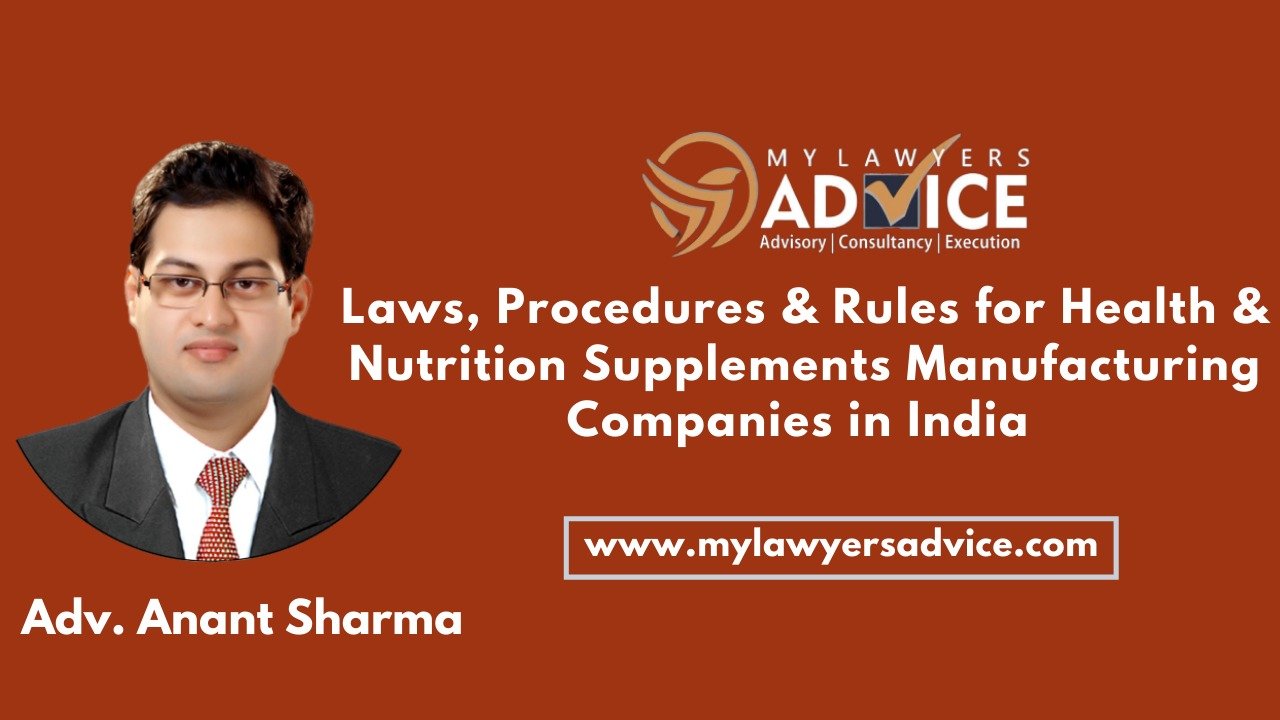Laws, Procedures & Rules for Health & Nutrition Supplements Manufacturing Companies in India | Healthcare Lawyer in Delhi NCR | Pharma Lawyer in Delhi NCR

Healthcare Lawyer in Delhi NCR | Healthcare Lawyer in Delhi | Healthcare Lawyer in Gurugram | Healthcare Lawyer in Noida | Pharma Lawyer in Delhi NCR | Pharma Lawyer in Delhi | Pharma Lawyer in Noida | Pharma Lawyer in Gurugram | Corporate Lawyer in New Delhi | Corporate Lawyer in India | Corporate Lawyer in Delhi NCR | Corporate Lawyer in Delhi | Corporate Lawyer in Noida | Corporate Lawyer in Gurugram | Legal Advice for Pharmaceutical Companies in Delhi NCR | Legal Advice for Pharmaceutical Companies in Noida | Legal Advice for Pharmaceutical Companies in Gurugram | Legal Advice for Pharmaceutical Companies in Delhi |
Nutritional medicine is primarily based on the principle that nutrients, along with other important micronutrients are required for the efficient and proper functioning of all the different biochemical processes in which our bodies rely. The “Health & Nutrition Products”, in essence, comprise of different products, which either add to, supplement the nutrition or provide us with a part or all of the daily required nutritional necessities. They include oral or intravenous nutrition that can provide the concerned patient with all the required nutrition. The way in which a person can determine which nutritional medicine to take is by means of a doctor’s advice, who is well-experienced in the study of food and the different nutrients it comes with, and how this diet has an effect on wellbeing and health.
In India, the main regulating authority when it comes to health & nutrition supplements is the Food Safety Standards Authority of India (FSSAI). The present law which governs nutritional supplements in India is the Food Safety and Standards Act, 2006. It is necessary to take into consideration that many products, claiming to comprise of immense amounts of minerals and vitamins, are being sold in retail all over the Indian market as food or health supplements. Similarly, multivitamin products and tablets containing distinct nutrients are being sold as drugs, with the required licensing from different Drug authorities. This liberty which is being taken by the manufacturers in the guise of food safety laws to go away from the rigours of drug laws receive importance, as the traders and manufacturers of food supplements may be running the risk of getting prosecuted if they categorized incorrectly.
There is a very thin line of comparison between nutrition supplement and drugs, particularly in a case where the quantum and contents of nutritional vitamins and value are specifically mentioned on the product for different commercial reasons. Further, Nutritional Supplements come within the ambit of the term ‘proprietary foods’ in India.
The precautions to be undertaken by a company while entering into the production of nutrition supplements are as follows, and the same have accordingly been mentioned in the Prevention of Food Adulteration Rules of 2011:
(a) the manufacturer of proprietary products shall obtain separate licence for manufacture of each proprietary food products:
(b) the name of the food and/or category under which it falls in these rules shall be mentioned on the label;
(c) tobacco and nicotine shall not be used as ingredients in the manufacture of proprietary food products;
(d) where any food contains any allergenic and / or hypersensitive ingredients as identified under the rules, or any ingredient originating from an allergenic and / or hypersensitive ingredients does not specify the allergenic ingredients / hypersensitive ingredients, such food shall the label declaration
(e) the proprietary food product shall not contain food additives except as provided in the rules for that food and / or category of food.”
It was held by the Hon’ble High Court of Bombay in the case of State of Maharashtra vs Pravin Krishnadas Shah, Criminal Appeal No. 1091 of 1980, that certain supplements could not be considered as drugs since “It is understandable that proteins are known to be a body building substance, hence they can be considered to be nutritional products, while a medicine comes with the ambit of the term “therapeutic substance” – a word which is essentially related to healing. In the absence of such evidence on the required aspects it would be tough to bring proteins within the meaning of the word ‘medicine’.
Thus, there exists straight set of laws and rules which regulate the manufacturing of health & nutrition supplements in India.
Authored By: Adv. Anant Sharma & Abhijith Christopher
